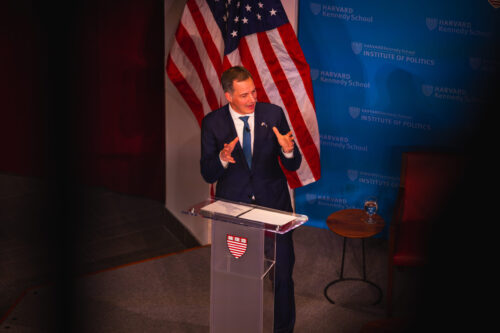On Jan. 31, outgoing Belgian Prime Minister Alexander De Croo delivered a speech at the Harvard Institute of Politics on the future of the European economy and international security. The talk was one of two flagship events hosted as part of the student-organized European Conference at the Harvard Kennedy School.
De Croo, who has served as prime minister since 2020, is set to step down soon. His party, the Open Flemish Liberals and Democrats, suffered a major electoral defeat in June 2024. A new coalition government was announced to have formed on Jan. 31, just before he spoke to the crowd at the John F. Kennedy Jr. Forum. Bart De Wever, who leads the New Flemish Alliance, allied with Francophone and Flemish nationalist parties to form a majority coalition in the Belgian Federal Parliament. Assuming the party congresses assent, De Wever, who has been described as a Flemish separatist, will take power at a date yet to be determined.
De Croo asserted that American allies in Europe need to strike a balance between cooperating with U.S. policy under President Donald Trump and pursuing their own national and continental interests.
“If we move into an era of interests and of being transactional—if the U.S. administration says trade deficit is a problem—okay, let’s find a solution, but that’s not a solution where our interests are aligned,” he said. “As Europeans, we should be doing the same. As Europeans, if there are certain things which are important to us, we shouldn’t be afraid to defend that.”
He specified that Belgium plans to continue adhering to the Paris Agreement alongside other European Union member states. This assertion contrasts with the American withdrawal from the 2016 climate change treaty, which was prompted by an executive order signed by Trump after his Jan. 20 inauguration.
Like the rest of the EU, Belgium aims to be climate-neutral by 2050. “I know that ‘drill, baby, drill’ is a good time,” he said. “I’m not convinced that this is bulletproof industrial policy for the next decades to come. So we believe that we need to push our industry to make the right investments, to invest, that our industrial processes can decarbonize.” Belgium’s greenhouse gas emissions have decreased by nearly one-tenth since 2020 and over one-quarter since 1990.
De Croo went on to reaffirm Belgium’s commitment to NATO. “We Europeans will invest way more in NATO,” he clarified. “There was no discussion on that. If NATO wants to function, it needs to stand on two strong legs, and the leg on the other side of the planet—it needs to be as strong as the leg on this side of the planet.”
Since his reelection, Trump has called for all NATO member states to spend 5% of their annual gross domestic product on military spending, which has divided European leaders.
De Croo pushed back on the idea that the structure of NATO inherently places an undue burden on the United States, as Trump has historically suggested. He brought up Article Five of the North Atlantic Treaty, which requires NATO member states to defend each other if one calls for assistance. “It’s happened once in history. Who invoked Article Five is the United States… It’s not European countries.”
The United States invoked Article Five on Oct. 5, 2001, in the aftermath of the Sept. 11, 2001 attacks. Thus, NATO member states participated in both Operation Eagle Assist, which called for aircraft deployment to patrol American airspace, and Operation Active Endeavor, which required member states to assist American efforts to curb terrorist activity in and around the Mediterranean Sea.
“I’m convinced that this relationship, this transatlantic relationship, is not only about economics; it’s not only about interests, it’s also about balance, and it’s important that we work on the fact that it is about values and that I believe is our real strength,” he said. “The United States and Europe—we have been a bacon—a beacon, not a bacon…we have been a beacon to the world.”
He acknowledged that the future might bring challenges to relations between the U.S. and EU but urged Americans not to “throw away where we have been successful.”
“Why do I believe in politics?” he questioned. “Well, that’s because I believe that we have an ability to overcome obstacles, and that we have an ability to bring people together.”
After De Croo spoke, Natalie Colbert, the executive director of the Belfer Center for Science and International Affairs, moderated a discussion with the prime minister. In response to a question she posed about the tension between rising nationalism, Euroskepticism, and health coordination, he argued that the European Union tends to come together rather than crumble during times of crisis.
“History has shown that the European Union moves forward when we have our back against the wall,” he said. “It’s in crisis that we move forward. That’s what happened in COVID, that’s what happened in the energy crisis. I think we have our back against it, and especially on industrial competitiveness will be a difficult situation. As I said, you can’t soothe the alarm clock anymore. You really have to move forward.”
De Croo condemned Russian hostility toward European nations. “Restoring the integrity of the state to Ukraine, paying for all the damages, stopping interference in Moldova, there’s quite a list of things that you can demand from Russia before we could even normalize a relationship with Russia,” he said.
The European Conference concluded on Feb. 1. Other flagship events included a talk with Mirjana Spoljaric Egger, President of the International Committee of the Red Cross, and a discussion with Benjamin Haddad, Minister Delegate of France for Europe.
Jules Sanders ’28 (julessanders@college.harvard.edu) is the Associate News Editor of the Independent.

